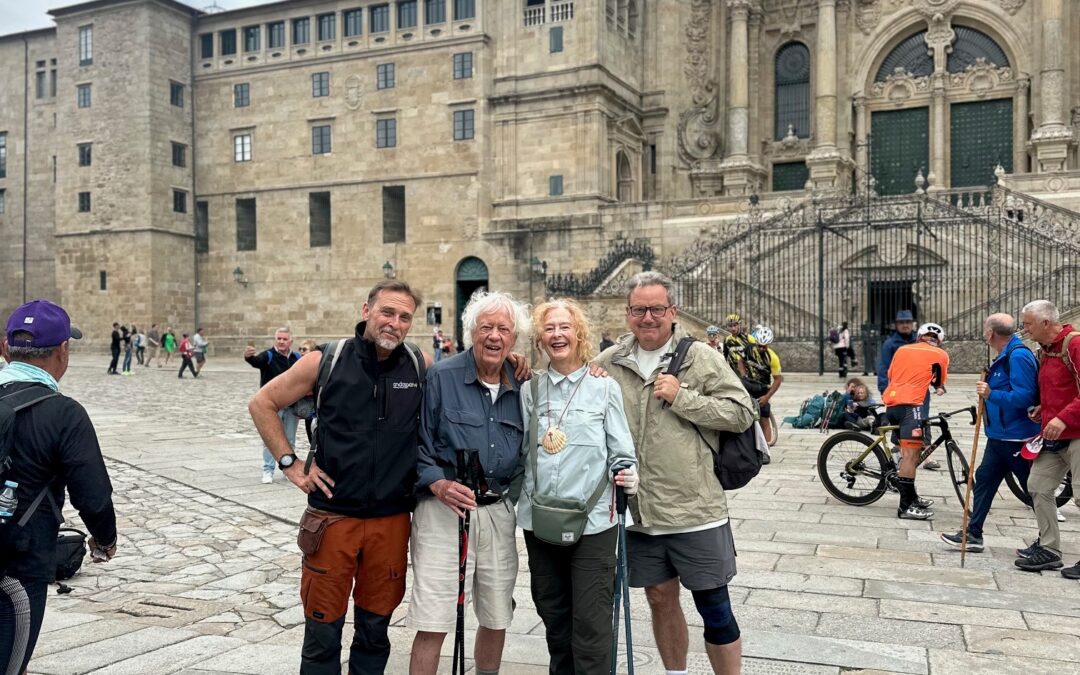Over ten years ago, I watched “The Way,” a movie starring Martin Sheen and Emilio Estevez. It’s about an American father (Sheen) who travels to Europe to retrieve the body of his estranged son (Estevez), who died while attempting the pilgrimage to Spain’s Santiago de Compostela. It’s a moving film on a number of levels, and after watching it, I made a promise to myself to one day hike the Camino myself.
For the past decade, I’ve come up with lots of reasons why I cannot go, but this year was different. This year, I told myself I was going on the hike—no matter what. No more excuses.
The Camino de Santiago, the “Way of St. James,” is a network of ancient pilgrimage paths across Europe that leads to the tomb of St. James the Apostle (Santiago in Spanish) in the Santiago de Compostela cathedral in northwest Spain.
Embarking on the Camino de Santiago, particularly the Camino Portugues path, is a transformative experience. In June, I walked 100 miles over eight days, mostly alone, and I found both physical exhaustion and spiritual renewal. The pilgrimage taught me invaluable lessons about life, faith, and what truly matters.
The Physical Challenge
Of course, walking 100 miles in eight days tested my endurance and resilience and stamina. The varied terrain—from urban streets to rural paths—required perseverance. Despite being tired and experiencing occasional pains, the physical challenge was rewarding. It is proof positive that life’s difficult roads are worth traveling for the meaningful destinations they lead to. There is just something oddly peaceful about being so physically tired day after day vs. my usual mental exhaustion after long days at work. (I realize now that I never truly settle down. My motor is always going, and there is a cost to living a revved-up life.)
Solitude and Reflection
While many people walk with others, I chose to walk alone most of the time, and this gave me ample time for reflection. For much of the journey, I just enjoyed the beautiful scenery in Portugal and Spain. But in quiet, more introspective moments, I contemplated life’s deep questions, and I found peace and clarity. My solitude brought me closer to God, reinforcing my belief that He is always with us, guiding and supporting us through life’s challenges.
The Importance of Family
While I am grateful for my family every day of my life, the pilgrimage helped me understand how truly and deeply important they are to me. Each text or call from my wife, Susan, and our children reminded me of the bonds and love that tie us together. Each note and conversation, no matter how short, provided motivation and comfort during my journey.
I also added to my “family” during this trip. While I mostly walked alone, I was not entirely alone. I went on the Camino with a guide named Piero and two other “pilgrims,” Kirby and Robert (both in their early 80s; let me tell you, they were inspiring!). We ate together, walked some together, and experienced the beauty of the two countries together. The four of us also shared our lives with each other. The main topic? Family. We didn’t really talk about what we do (or did) for a living; we didn’t talk about the stuff we have. We did talk about who we are as people, and we talked a lot about our families.
Embracing Simplicity
Living with only a small suitcase of essentials for two weeks taught me to appreciate the beauty of simplicity. Each day focused on basic needs, allowing me to shed what I call “the swarm” of life, things like deadlines, meetings, emails, texts, family responsibilities, social commitments, etc. I was able to find joy in small, mindful moments. The Camino was eight days, and I was in Europe for 14 days. That second week was when I really relaxed, silenced the swarm, and listened to my subconscious. I reflected on big questions. “What’s important to me in life?” “Where am I today, and where do I want to go in work and in life?” “Why do I want to do that?”
Spiritual Renewal
Above all, the Camino provided me with profound spiritual renewal. (There is a reason they call it a “pilgrimage.”) The combination of physical exertion, solitude, and reflection deepened my Catholic faith. And it instilled in me a renewed sense of purpose based on love, compassion, and gratitude.
Walking the Camino de Santiago was truly a life-changing experience. It made me more grateful for God and family (the one I have and the one I made on the journey). I finished with a deep appreciation for simplicity, resilience, and spiritual renewal. For anyone considering this pilgrimage, I absolutely encourage you to take the leap. It’s a journey of self-discovery and spiritual growth that will leave you with lessons and memories for a lifetime.
It is not easy. The big, important things in life rarely are. But I know that the experience of having gone on this journey will help me do what I do better—with more clarity and more purpose.
